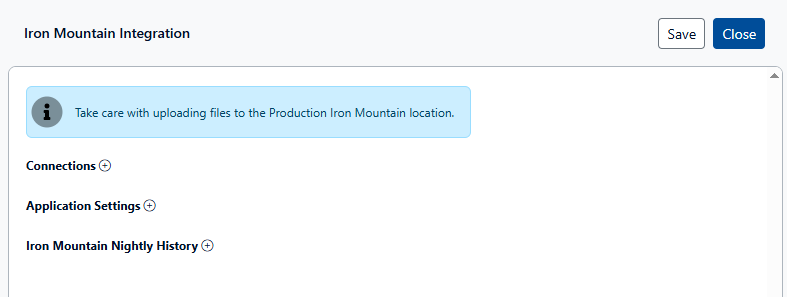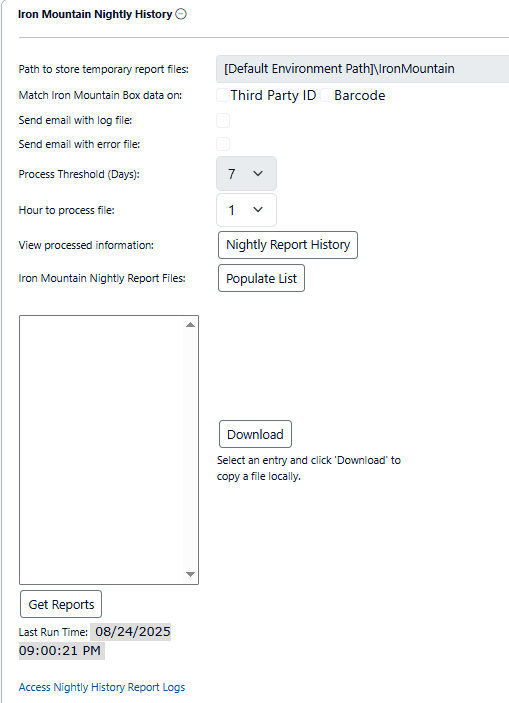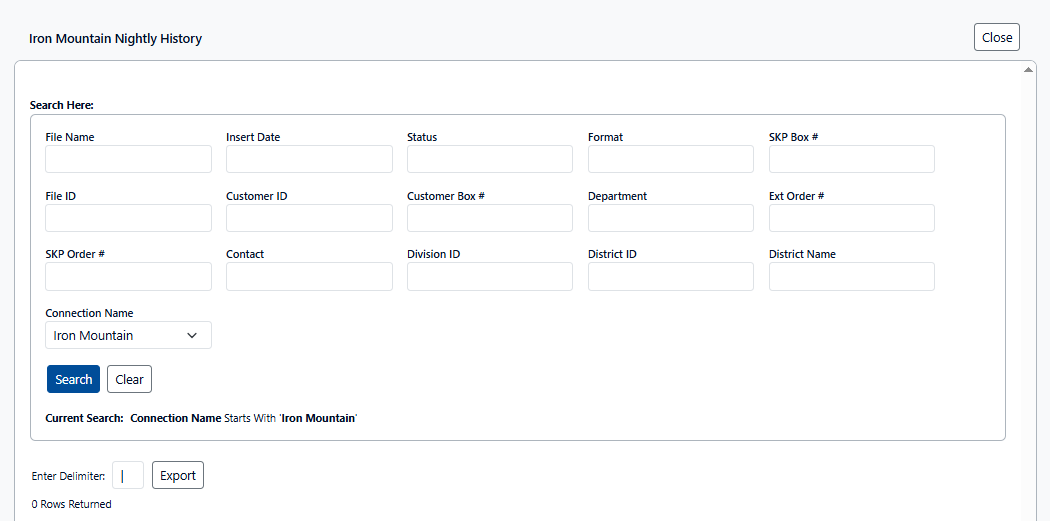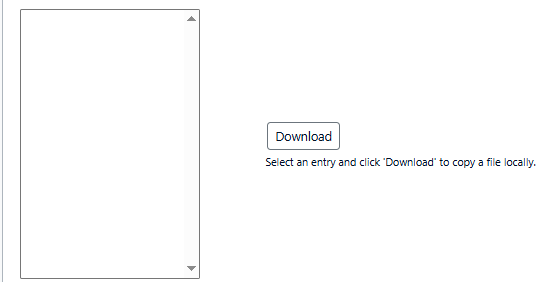Iron Mountain Configuration Settings
Not all features are available in all versions. This page reflects the latest 4.x version of Gimmal Physical. For earlier versions, please view legacy help documentation found here.
The configuration settings for Iron Mountain can be found on the Iron Mountain integration page. This view is accessed via the Integration section on the Administration page reached by clicking the Gear icon, ‘Admin’ menu option from the upper right navigation bar.

The Iron Mountain Integration Page contains three sections:
Connections provides options for setting up the required details for a successful transfer of information to and from the Iron Mountain Secure FTP site.
Application Settings section shows choices for specific Iron Mountain related options in Gimmal Physical
Iron Mountain Nightly History section is only available if the Nightly History Reports are enabled in the Application Settings. It displays the options available for processing of these files.
Connections
To successfully connect to Iron Mountain and transfer orders, the connection information must first be configured.

The connection section contains multiple parts
A: Enter new connection information
B: View and edit existing connection information
C: Overall connection options
D: Test and troubleshoot files found at the selected connection
The options are as follows:
Name | Description |
|---|---|
Connection Name | Descriptive name for the connection. This text will be used to populate the ‘Iron Mountain Record Center' drop-down options. |
Email Address | Address that will receive notifications from Gimmal Physical when orders are submitted to Iron Mountain, and, if enabled, reports and error logs from the Nightly History report (version 4.1 and above only). |
User Name | Name of the account that has access to the secure FTP site. |
Password | Password of the Iron Mountain account that has access to the secure FTP site. |
Date Format | Enter a valid date format for this connection. The default is MMddyyyy. Only use other options when directed to do so by the Gimmal professional services or support teams. |
Hybrid | Advanced option to identify special case regional centers in coordination with Iron Mountain. Do not enable this option unless told to do so by Gimmal Support. |
 | Adds the details to the connection list (if not already present). |
 | Updates the item with any changes entered in the editable fields. |
 | Removes the connection from the list. |
Iron Mountain FTP URI | Drop down a list of the addresses of the secure FTP Sites to transfer Iron Mountain files. Only options from the available values can be chosen. The label following this drop-down list will read Testing or Production based on the values selected. |
Enable Request of Files | Option to enable the requesting of Files to be transferred to and from Iron Mountain. The default value is unchecked (False). |
Upload Iron Mountain File | Options available to test or manually upload files in real-time or using the job service. |
 | Opens a dialog box to select an Iron Mountain formatted file created by Gimmal Physical to use in testing, or to manually load into the system. |
 | Manual upload of a file for testing (if the URI listed is the test site) or reprocessing (if the URI listed is the production site) for the chosen file. Transfers cannot be performed when submitting an Iron Mountain request from this page, including using the ‘Test Upload’ button. |
 | Imports the file that is on the listed secure FTP site into the View window (on the left) for review. |
 | Runs the file through the scheduled job service for
The file processed via the service can be viewed in the box on the right side of the screen. Transfers cannot be performed when submitting an Iron Mountain request from this page, including using the ‘Schedule’ button. |
Job Status | The results of the tested job, run from either the ‘Test Upload’ or ‘Schedule’ |
Application Settings
This section allows users to set defaults for a variety of request and delivery options.

Name | Description |
|---|---|
Enabling Nightly History Reports | Should the processing of the Iron Mountain Nightly History Reports be enabled for the selected connection. The default is ‘No’. Enabling this option will:
|
Default Request Type | This choice will populate the default options for all Request Type drop-down controls in the application. Note: Found in 3.15.1 and above only |
Available Request Type | The drop-down list shows all available options for Iron Mountain Request Types. Administrators can add as many or as few options for their end users by highlighting an item and choosing ‘Add’ or ‘Remove’. The choices will then populate the dropdown lists for all the Request Types in the application. Note: Found in 3.15.1 and above only |
Default Delivery Priority | This choice will populate the default options for all Delivery Priority drop-down controls in the application. Note: Found in 3.15.1 and above only If Scheduled is chosen as the priority:
|
Available Delivery Priority | The drop-down list shows all available options for Iron Mountain Delivery Priorities. Administrators can add as many or as few options for their end users by highlighting an item in the list and choosing ‘Add’ or ‘Remove’. The choices will then populate the dropdown lists for all the Iron Mountain Delivery Priorities in the application. Note: Found in 3.15.1 and above only |
Default Delivery Date | Note: Found in 4.1 and above only The drop-down list shows all available options for Iron Mountain Delivery Date. The control will be disabled if there is only one option. |
Iron Mountain Transfer requests Preference | This option presents the choice of how to handle transfers for Iron Mountain Items within Gimmal Physical.
The advanced and automated functions of the Nightly History Report (logs, errors, updates, etc.) will only be available if the ‘Transfer based on nightly history report’ option is selected. |
Nightly History Report
When enabled, the nightly history report generated by Iron Mountain can be used to perform automated updates and report discrepancies with orders and deliveries.

This section is only displayed when the ‘Enabling Nightly History Reports’ option in the Application section is set to ‘Yes’.
Many of the options listed below will be disabled if the Transfer Requests Preference is NOT set to 'Transfer based on Nightly History Report'
Name | Description |
|---|---|
Path to store temporary report files | Read-only field displaying the location where local copies of the nightly history reports are kept for troubleshooting purposes. The value of this path is typically the Temp folder configured on the Admin | Application Settings page. |
Match Iron Mountain Box data on | These checkboxes list the Gimmal Physical fields for Boxes that should be matched with the Iron Mountain values in the Nightly History Report to ensure the correct items are updated for each type. Enable the options that apply. The choices listed depend on the label options enabled for these Box values, but they are typically:
|
Match Iron Mountain File data on | These checkboxes list the Gimmal Physical fields for Files that should be matched with the Iron Mountain values in the Nightly History Report to ensure the correct items are updated for each type. Enable the options that apply. The choices listed depend on the label options enabled for these File values, but they are typically:
This section only appears if the application is configured to process Files with Iron Mountain. |
Send email with log file | When enabled, this will send an email with a transaction log file for each processed .dat file collected from Iron Mountain per night. |
Send email with error file | When enabled, this will send an email with an error log file for each processed NHR.dat file that had error lines |
Process Threshold (Days) | The number of Days the system should wait before declaring a status of Error |
Hour to process file | The hour of the day that the file will be processed. Although Iron Mountain typically generates the Nightly History Report around Midnight (US Eastern Time), this can be delayed. |
View processed information   | Opens the 'Nightly History Report Details' view, which shows a searchable table of the individual lines found in the Nightly History report files. This view is very helpful for troubleshooting or viewing line-level details from the nightly history reports. |
Iron Mountain Nightly Report File  | This button will connect to the FTP site chosen in the connection list and populate the text box with a list of .dat files that are currently stored on the FTP site. This facilitates testing or troubleshooting of the Nightly History Report. |
 | The text box can be populated with a list of .dat files using the ‘Populate List' button. Once populated, selecting a file and clicking the ‘Download’ will download and copy the chosen file locally via the browser. |
  | This button runs the nightly. Gimmal Physical job processes the Nightly History Reports. This is useful for troubleshooting or in case the nightly job did not run. A text box will appear once the job has been scheduled. |
Last Run Time | Read-only field indicating the last time the Gimmal Physical job service for the Nightly History Reports was run. |
Access Nightly History Report Logs  | This link opens the Nightly Report Logs view, which shows the transaction and error logs for each nightly history report file that was processed. |
Connector Setup
After configuring and testing the connection, a number of actions must be performed for the Iron Mountain Connector to perform as expected.
A location record must be designated as an Iron Mountain location by choosing Iron Mountain as the Off-Site Vendor. Multiple Iron Mountain locations are supported.
Transit Information will also need to be entered for:
Any location that will have items picked up from or delivered to.
Any User that will have items picked up from or delivered to Iron Mountain.
Customer record(s) will need to be created that contain the Customer ID and District ID assigned by Iron Mountain. Additionally, address information and contact name can be entered.
Box records will need to have a current location, an IM Box Size value, a Customer ID, and a District ID before they can be requested for pickup or delivery.
File records will need to have a current location and a Customer ID before they can be requested for pickup or delivery. District ID is preferred, but not required.
For request pickups, the destination will need to be set to an Iron Mountain location.
Errors will be displayed on the view requests page of records that are updated to make them invalid after a successful request has been made, but before they have been submitted to Iron Mountain.
Items in error will be back colored in yellow.
The issue for a given record can be seen by the tool tip over the item description hyperlink.

If you are using the Iron Mountain connector with multiple Iron Mountain accounts in multiple regions (i.e. multi-region accounts), There are several items to note to ensure the correct setup:
Only version 4.1 and above will support multi-region Iron Mountain accounts.
The connections for each region must first be created in the Configuration page.
There must be an Iron Mountain location record per region.
These locations must be ‘Hub’ locations.
These locations must have the correct region listed in the ‘Iron Mountain Record Center' field.
For Gimmal Physical 3.14 and below
If you are using the Iron Mountain integration, Gimmal strongly recommends you upgrade to 4.1 or above to use the most current format and advanced options.
Iron Mountain account information must be entered in the Gimmal Physical Application Settings page.

The path to the folder on the SFTP site associated with Iron Mountain.
The Username for the SFTP site associated with Iron Mountain.
The password for the SFTP site associated with Iron Mountain.
Preferences
A preference setting is available to enter an email address that will receive notifications when orders are submitted to Iron Mountain.

Note: In 3.14 or below, the integration value for locations and boxes does not choose Iron Mountain as the Off-Site Vendor. Rather, there is a special checkbox noted as ‘Is Iron Mountain’ which designates the item as being associated with Iron Mountain.
